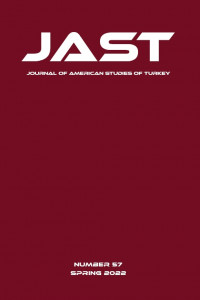Abstract
Anzia Yezierska’s Hungry Hearts (1920) is a collection of short
stories set in New York City’s Lower East Side district and portrays
Jewish working class women as they experience the problems of urban
poverty and immigration as trauma. This article analyzes Hungry
Hearts as a short story cycle in light of trauma theories and argues that
Yezierska’s protagonists suffer from what Maria Root calls “insidious
trauma”. Therefore, it holds that the dialectic of fragmentation and
cohesion in the short story cycle form conflates with the insidious trauma
of Yezierska’s protagonists. From this perspective, the article claims
that the narrative logic of Yezierska’s work illustrates the inevitable
continuity of insidious trauma because the stories follow a sequence
of gradually aging protagonists. However, Yezierska also offers an
alternative by creating two evental moments of intergenerational
interaction in her last two stories. Drawing from Alain Badiou’s
concept of the “event” and Dominick LaCapra’s trauma theory, this
article argues that such moments function as departures from the initial
narrative logic and let the characters reformulate their futures.
References
- Badiou, Alain. Being and Event. Continuum, 2009.
- ---. Ethics: An Essay on the Understanding of Evil. Verso, 2002.
- Batker, Carol. “Literary Reformers: Crossing Class and Ethnic Boundaries in Jewish Women’s Fiction of the 1920s.” MELUS, vol. 25, no.1, Spring 2000, pp. 81-104.
- Bistoen, Gregory; Stijn Vanheule; Stef Craps. “Badiou’s Theory of the Event and the Politics of Trauma Recovery.” Theory & Psychology, vol.24, no.6, 2014, pp. 830-851.
- Brown, Laura S. “Not Outside the Range: One Feminist Perspective on Psychic Trauma.” Trauma: Explorations in Memory, edited by Cathy Caruth, The Johns Hopkins University Press, 1995, pp. 100-112.
- Campos Ferraras, Rebeca. “Whitening Domestic Spaces: Enacting Female Roles in Anzia Yezierska’s The Lost Beautifulness.” The Grove. Working Papers on English Studies, vol.26, 2019, pp. 9-26.
- Caruth, Cathy. Introduction. Trauma: Explorations in Memory, edited by Cathy Caruth, The Johns Hopkins University Press, 1995, pp. 3-12.
- Trauma and Event in Anzia Yezierska’s Hungry Hearts 156 Craps, Stef and Gert Buelens. “Introduction: Postcolonial Trauma Novels.” Studies in the Novel, Vol. 40, no.1&2, 2008, pp. 1-12.
- Di Nicola, Vincenzo and Drozdstoj Stoyanov. Psychiatry in Crisis: At the Crossroads of Social Sciences, the Humanities, and Neuroscience. Springer, 2021.
- Dunn, Maggie and Ann Morris. The Composite Novel: The Short Story Cycle in Transition. Twayne, 1995.
- Edmunds, Susan. “Between Revolution and Reform: Anzia Yezierska’s Labor Politics.” Modernism/modernity, Vol. 18, no.2, 2011, pp. 405-423.
- Erdheim Kilgallen, Cara. “Naturalism’s International Identity AntiSemitism, Alienation, and Women’s Writing.” CR: The New Centennial Review, vol. 20, no. 3, 2020, pp. 153-178.
- Farooq, Nihad M. “Of Science and Excess: Jacob Riis, Anzia Yezierska, and the Modernist Turn in Immigrant Fiction.” American Studies, vol. 53, no. 4, 2014, pp. 73-94.
- Forter, Greg. Gender, Race, and Mourning in American Modernism. Cambridge University Press, 2011.
- Gelfant, Blanche. Introduction. Hungry Hearts, by Anzia Yezierska, 1920, Penguin, 1997, pp. vii-xxxiv.
- Gibbs, Alan. Contemporary American Trauma Narratives. Edinburgh University Press, 2014.
- Golub, Ellen. “Eat Your Heart Out: The Fiction of Anzia Yezierska.” Studies in American Jewish Literature, no.3, 1983, pp.51-61.
- Jirousek, Lori. “Ethnics and Ethnographers: Zora Neale Hurston and Anzia Yezierska.” Journal of Modern Literature, vol. 29, no. 2, Winter 2006, pp. 19-32.
- Kollontai, Alexandra. Selected Writings of Alexandra Kollontai. Translated by Alix Holt, Lawrence Hill and Company, 1978.
- Konzett, Delia Caparoso. “Administered Identities and Linguistic Assimilation: The Politics of Immigrant English in Anzia Yezierska’s Hungry Hearts.” American Literature, vol. 69, no. 3, 1997, pp. 595-619.
- Korkalainen, Katrin. “Telling Tales of Difference: Portrayals of Immigrant Identity in Cahan’s, Cohen’s, and Yezierska’s ‘Landscapes’ of Otherness and Contrast.” Studies in American Jewish Literature, vol.40, no. 1, 2021, pp. 43-83.
- LaCapra, Dominick. Writing History, Writing Trauma. Johns Hopkins University Press, 2014.
- Lister, Rachel. Open Destinies: Modern American Women and the Short Story Cycle. 2005. Durham University, PhD dissertation.
- Lynch, Gerald. “Mariposa Medicine: Thomas King’s Medicine River and the Canadian Short Story Cycle.” Tropes and Territories: Short Fiction, Postcolonial Readings, Canadian Writing in Context, edited by M. Dvorak and W. H. New, McGill-Queen’s University Press, 2007, pp. 214-30.
- Mann, Susan Garland. The Short Story Cycle: A Genre Companion and Reference Guide. Greenwood Press, 1989.
- Merish, Lori. “The Matter of Identification: Yezierska’s Arrogant Beggar and the Gendered Injuries of Class.” Studies in American Fiction, no. 39.2, 2012, pp.207-241.
- Mikkelsen, Ann. “From Sympathy to Empathy: Anzia Yezierska and the Transformation of the American Subject.” American Literature, vol. 82, no. 2, June 2010, pp. 361-388.
- Nagel, James. The Contemporary American Short-Story Cycle: The Ethnic Resonance of Genre. Louisiana State University Press, 2001.
- Pavletich, JoAnn. “Anzia Yezierska, Immigrant Authority, and the Uses of Affect.” Tulsa Studies in Women’s Literature, Vol. 19, no.1, 2000, pp. 81-104.
- Root, Maria P. P. “Reconstructing the Impact of Trauma on Personality.” Personality and Psychopathology: Feminist Appraisals, edited by Laura S. Brown and Mary Ballou, Guilford Press, 1992, pp. 229–65.
- Schoen, Carol B. Anzia Yezierska. Twayne, 1982. Schwab, Gabriele. Haunting Legacies. Columbia University Press, 2010.
- Wald, Priscilla. “Of Crucibles and Grandfathers: The East European Immigrants.” The Cambridge Companion to Jewish American Literature, edited by Hana Wirth-Nesher and Michael P. Kramer, Cambridge University Press, 2003, pp. 50-69.
- Wallach, Kerry. “Buy Me a Mink: Jews, Fur, and Conspicuous Consumption.” Jewish Consumer Cultures in Nineteenth and Twentieth-Century Europe and North America, edited by Paul Lerner, Uwe Spiekermann and Anne Schenderlein, Palgrave Macmillan, 2022, pp. 133-158.
- Whitehead, Anne. Trauma Fiction. Edinburgh University Press, 2004. Yezierska, Anzia. Children of Loneliness. Cassell and Company, 1923. ---. Hungry Hearts. Penguin, 1997.
Details
| Primary Language | English |
|---|---|
| Subjects | North American Language, Literature and Culture |
| Journal Section | Research Article |
| Authors | |
| Publication Date | June 14, 2023 |
| Published in Issue | Year 2022 Issue: 57 |
JAST - Journal of American Studies of Turkey

